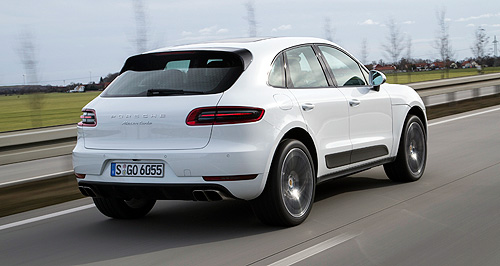News - Porsche - MacanPorsche caps Macan production - initiallyAddition: The Macan will be Porsche's price-leader, and will fight in the booming compact SUV market. Modest production levels for Porsche Macan means Cayenne to outsell it for now14 Feb 2014 By MIKE COSTELLO in LEIPZIG, GERMANY PORSCHE is plotting a slow-burn global launch for its price-leading new Macan compact SUV, capping initial German production to just 50,000 units per year - about 30,000 fewer than the larger and pricer Cayenne. This means that despite entering a booming segment and priced to scare rivals bereft of such a lucrative badge, it will not be the brand’s global top-seller - at least early in its model life. Of this 50,000 volume, roughly one-third will go to Europe, one-third to the Americas and one-third to the Asia Pacific region including Australia, but also including China, which will take the majority of this supply. Porsche Australia director of public relations Paul Ellis says the company is "very happy" with its supply levels. It would want to be, with 200 firm orders already locked away ahead of the car's June launch. Doing the sums, expect a waiting list on some variants as found on selected versions of the Cayenne, which command a wait-time of six months or more. Porsche Australia does not disclose its internal sales expectations, saying it is a “moving target” as it works out precisely what demand will be. It is understood the Macan is viewed as having the potential to be its top-seller in Australia due to its sharp pricing - kicking off at $84,900, it is easily Porsche's cheapest car here - if supply lines can support the demand. For context, it sold 1120 Cayennes in 2013, around four-times more than its second top-selling model, the 911. Explaining Porsche’s decision to cap global production, chairman of the global executive board Matthias Muller said the company wanted to ensure its newly expanded Liepzig plant gets its quality control sorted from the get-go. The company also expects to face challenges marketing a completely new model name compared to the established Cayenne, notably in the US and China. In time, it says, production can be ramped up by adding an extra shift at the factory. “We started with a sound, maybe you can call it a modest approach,” said Mr Muller. “We had always calculated the project with 50,000 units, but if the markets should respond more positively to this vehicle, we can look at producing more, either by re-organising our labour structure or investing more."If signs from Porsche’s Australian arm are indicative of a global trend, the company may need to ramp its levels up sooner rather than later. As reported, the range launching Down Under this winter is priced from $84,900 for the diesel S up to $122,900 for the Turbo, with the petrol S in-between at $87,200. This means entry versions are priced right in line with the Audi SQ5 ($89,400), and only slightly more than the BMW X3 xDrive 30d ($76,500). Porsche expects the diesel to be the top-seller, but demand for the Turbo relative to supply will likely be the highest, with several-month long waiting lists distinctly possible. Making the Macan even more vital to Porsche is the fact that it will conquest sales from rival brands, including ones with a less ‘premium’ badge. Porsche expects to lure younger buyers, most of them Porsche first-timers. “One thing is for sure,” said Mr Muller. “The Macan will further push the growth of the company, and make a substantial contribution in ensuring the long term future of Porsche.” The Macan is expected in both Australia and abroad to net a younger buyer than other Porsche models, with 35-45 year old upwardly mobile types a key demographic. The typical 911 buyers, for instance, tends to be more than 50 years old. As reported, the aforementioned plant upgrades to the Liepzig facility resulted in a doubling of its workforce to 2550 staff, and an increase in capacity of almost 50 per cent. The plant upgrades include an extension of roughly 17 hectares covering an area equivalent to about 24 soccer pitches. Porsche claims it was completed in near-record time, no doubt to capitalise on the global boom in SUV sales. Both the Panamera sedan and the Cayenne are built in Liepzig already, with 27,056 units of the firmer and 83,208 units of the latter made in 2012.  Read more |
Click to sharePorsche articlesResearch Porsche Macan pricingMotor industry news |





















Facebook Twitter Instagram